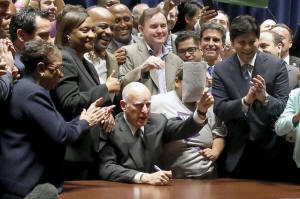|
 California
governor signs $15-an-hour minimum wage into law California
governor signs $15-an-hour minimum wage into law
 Send a link to a friend
Send a link to a friend
[April 05, 2016]
By Dan Whitcomb
LOS ANGELES (Reuters) - Governor Jerry
Brown on Monday signed into a law a bill raising California's minimum
wage from $10 to $15 an hour by the year 2023, making the nation's
most-populous state the first to boost pay to that level for the working
poor.
|
|
 The move marks the culmination of a deal Brown brokered with labor
leaders and state Democratic leaders and puts California, home to
one of the world's biggest economies, at the forefront of U.S.
states and cities that have moved to surpass the federal minimum
wage, which has remained at $7.25 an hour since 2009. The move marks the culmination of a deal Brown brokered with labor
leaders and state Democratic leaders and puts California, home to
one of the world's biggest economies, at the forefront of U.S.
states and cities that have moved to surpass the federal minimum
wage, which has remained at $7.25 an hour since 2009.
"This is about creating a little tiny bit of balance in a system
that every day becomes more unbalanced," Brown said before signing
the legislation.
"There's a lot of anger going on in the presidential campaign," he
said. "And one of the sources (of that anger) certainly is the way
the average American is being treated."
Both houses of California's legislature approved the measure on
Thursday, fast-tracking proposed legislation announced two days
earlier by Brown, a popular Democrat.
 Raising the minimum wage has cropped up on many Democratic
candidates' agendas ahead of the November elections in the hopes it
could help mobilize voters. Democratic presidential hopeful U.S.
Senator Bernie Sanders has called for raising the federal minimum
wage to $15 an hour by 2020.
In New York on Monday, Governor Andrew Cuomo signed a bill that will
eventually raise the minimum wage in New York City and surrounding
areas to $15 per hour. Other parts of the state will see the current
$9 per hour rate rise to $12.50 within five years.
The California measure heads off two competing ballot initiatives
that lacked a provision to allow the governor to suspend increases
in hard economic times, a deal-breaker for Brown.
[to top of second column] |

With polls showing strong support for those measures at the ballot
box, Brown emphasized that a version passed by the legislature would
allow lawmakers to amend it if needed instead of going back to
voters.
Moderate Democrats and most Republicans complained that the
legislation was being rushed through, and would disproportionately
harm businesses in poorer parts of the state, where the cost of
living is not high enough to warrant such a dramatic wage hike.
Fourteen states and several cities began 2016 with minimum wage
increases, typically phasing in raises that will ultimately take
them to between $10 and $15 an hour.
(Reporting by Dan Whitcomb; Editing by Alistair Bell and Bill Trott)
[© 2016 Thomson Reuters. All rights
reserved.]
Copyright 2016 Reuters. All rights reserved. This material may not be published,
broadcast, rewritten or redistributed.

 |